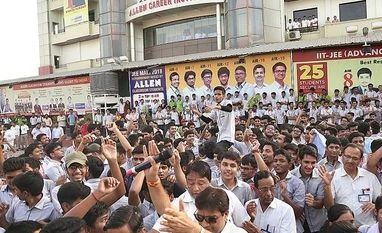It’s unlikely that any visitor to India’s coaching hub, Kota in Rajasthan, would have missed seeing the huge signboards of ALLEN Career Institute. Started in 1988 with less than 10 students, the institute became a dominant player in the engineering and medical entrance test coaching industry with 200,000 students a year across 46 centres, 15 of them in Kota alone.
The going was more than good, until the pandemic struck in March 2020 — right before the new batches of students were to arrive in April and May. Entrance exams were put off. And overnight, Kota became deserted. The in-classroom model of the country’s traditional test preparation industry, estimated between Rs 30,000 crore and Rs 40,000 crore a year, was suddenly shaky.
But another model was becoming robust: EdTech, with startups such as Byju’s and Unacademy, free of the confines of brick-and-mortar classrooms, attracting students with online teaching.
Now, as the traditional test preparation industry recovers from the pandemic shock, the way forward is clear: Hybrid — a combination of online and in-classroom teaching. Similarly, edtech firms, too, are accepting and adapting to the reality that the online model alone will not take them far in the game.
And the change is being fuelled by a healthy infusion of technology and money.
On May 1, Bodhi Tree, backed by James Murdoch and Uday Shankar, announced a $600 million investment in ALLEN. This followed Byju’s acquisition of Aakash Educational Services for nearly $1 billion and Veranda Learning's Rs 287 crore acquisition of T.I.M.E. (Advanced Educational Activities), a test-preparation institute chain. In a vote of confidence to the hybrid model. Byju’s plans to invest $200 million over the next two years to expand and build its hybrid tuition business.
An expanding class
In a post-pandemic world, traditional test preparation players such as ALLEN and Aakash are looking to grow in both directions — online and offline.
ALLEN, which was founded by four Maheshwari brothers (Rajesh, Govind, Naveen, and Brajesh), is looking to rapidly expand to 200 cities, from 46 cities and 125 centres currently.
Forming a board-led model headed by chairman-designate Brajesh Maheshwari, it hopes to reach 500,000 students annually in five years — up from 200,000.
“The pandemic has taught us that the situation can become uncertain overnight and so, the hybrid model of test prep coaching is here to stay,” said Maheshwari. “The investment will not only help us expedite physical expansion but to also virtually reach those students who are unable to come to our centres. The technology we adopt will allow us to interact with students online the same way we engage with them face-to-face in our physical centres.”
ALLEN is also focusing on the Gulf region. “Our partnership with Bodhi Tree will help us scale up our India operations through technology and also fuel our growth in West Asia,” said Keshav Maheshwari, Brajesh Maheshwari's son.
Aakash, which used to add 15-20 centres a year and had reached 200,000 students a year before Byju's acquired it in 2021, is today averaging 75 new centres annually and touching nearly 300,000 students.
“With the help of Byju's financial, marketing and technology muscle, our offline journey does not change fundamentally but gets accelerated even as we cater to students online,” said Aakash’s Managing Director Aakash Chaudhry. “Prior to Byju's deal, we clocked revenues of Rs 100 crore in FY21 on the digital side, which grew five times, while offline grew by 35-40 per cent.”
EdTech analyst Vaibhav Tamrakar, who is senior vice-president at PGA Labs, believes the latency with which traditional offline institutions used to expand to other cities is being removed, making it easier for students to access the same products online as well.
“A lot of traditional institutions that have created brands in test preparation hubs such as Kota, Bhilai and Hyderabad are now opening franchises in other cities. As a result, they don't need to open a full coaching institute in a city anymore,” said Tamrakar. “Traditional coaching centres had distance learning programmes earlier as well, so it’s not as though they are averse to technology.”
Tech support
Tech investment in traditional offline coaching is likely to continue because the anticipated returns are high. According to Narayanan Ramaswamy, national leader for education and skill development at KPMG India, the traditional test preparation industry was not scalable due to limitations such as dependency on teachers. With the new hybrid model, some of the major players have found the freedom to scale up.
Aakash is also able to cater to multiple income groups through the hybrid model. “Now, students have a choice based on what they can afford or their proximity to the centre. They can choose between offline, which is slightly premium, or online modes,” said Chaudhry.
KPMG’s Ramaswamy strikes a note of caution. “Investors were wary of investing till yesterday because they didn’t see a model worth scaling, which they now do. But if the National Education Policy (NEP) is implemented in its entirety, we will see multiple entries and exits across streams, disciplines and programmes, and the mad rush for a few seats in medical or engineering colleges might not last.”
In the next 15 years or so, students may not be worried about seats because of multiple entries and exits, he added. “Hence, investments will continue in this area for another five to 10 years after which it will mature, and returns will not be commensurate."
Tamrakar doesn’t agree: “Companies that are solving real problems will continue to grow.”
Unlock 30+ premium stories daily hand-picked by our editors, across devices on browser and app.
Pick your 5 favourite companies, get a daily email with all news updates on them.
Full access to our intuitive epaper - clip, save, share articles from any device; newspaper archives from 2006.
Preferential invites to Business Standard events.
Curated newsletters on markets, personal finance, policy & politics, start-ups, technology, and more.
)